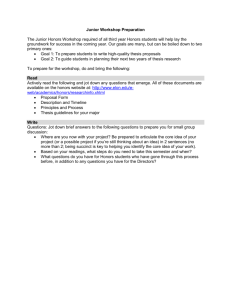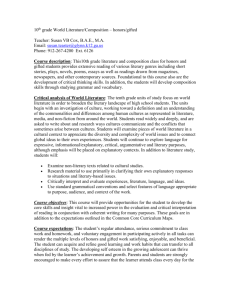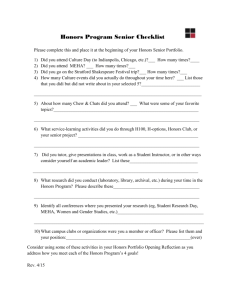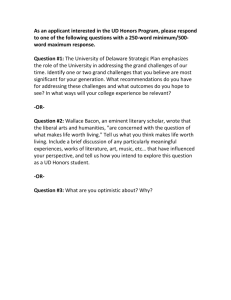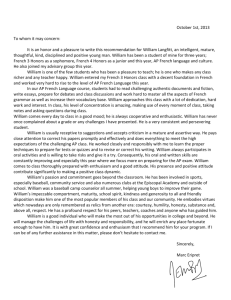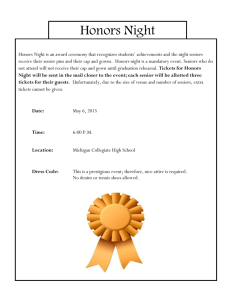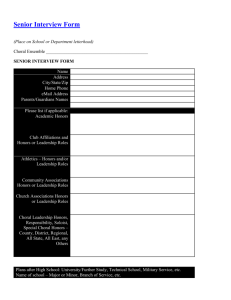Junior Honors English - Killingly Public Schools
advertisement
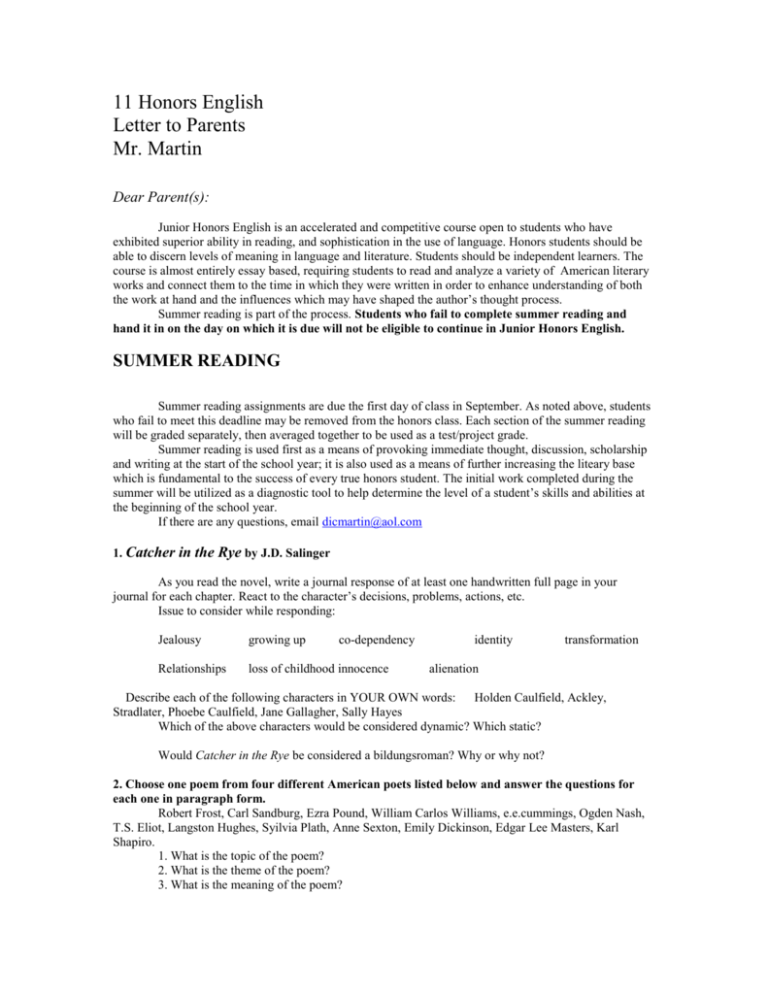
11 Honors English Letter to Parents Mr. Martin Dear Parent(s): Junior Honors English is an accelerated and competitive course open to students who have exhibited superior ability in reading, and sophistication in the use of language. Honors students should be able to discern levels of meaning in language and literature. Students should be independent learners. The course is almost entirely essay based, requiring students to read and analyze a variety of American literary works and connect them to the time in which they were written in order to enhance understanding of both the work at hand and the influences which may have shaped the author’s thought process. Summer reading is part of the process. Students who fail to complete summer reading and hand it in on the day on which it is due will not be eligible to continue in Junior Honors English. SUMMER READING Summer reading assignments are due the first day of class in September. As noted above, students who fail to meet this deadline may be removed from the honors class. Each section of the summer reading will be graded separately, then averaged together to be used as a test/project grade. Summer reading is used first as a means of provoking immediate thought, discussion, scholarship and writing at the start of the school year; it is also used as a means of further increasing the liteary base which is fundamental to the success of every true honors student. The initial work completed during the summer will be utilized as a diagnostic tool to help determine the level of a student’s skills and abilities at the beginning of the school year. If there are any questions, email dicmartin@aol.com 1. Catcher in the Rye by J.D. Salinger As you read the novel, write a journal response of at least one handwritten full page in your journal for each chapter. React to the character’s decisions, problems, actions, etc. Issue to consider while responding: Jealousy growing up co-dependency Relationships loss of childhood innocence identity transformation alienation Describe each of the following characters in YOUR OWN words: Holden Caulfield, Ackley, Stradlater, Phoebe Caulfield, Jane Gallagher, Sally Hayes Which of the above characters would be considered dynamic? Which static? Would Catcher in the Rye be considered a bildungsroman? Why or why not? 2. Choose one poem from four different American poets listed below and answer the questions for each one in paragraph form. Robert Frost, Carl Sandburg, Ezra Pound, William Carlos Williams, e.e.cummings, Ogden Nash, T.S. Eliot, Langston Hughes, Syilvia Plath, Anne Sexton, Emily Dickinson, Edgar Lee Masters, Karl Shapiro. 1. What is the topic of the poem? 2. What is the theme of the poem? 3. What is the meaning of the poem? 4. Pick out at least one literary device (alliteration, metaphor, simile, etc.) and explain how the poet uses this device effectively in the poem. 5. What is your reaction to the poem? (Journal response) 3. Short Stories – Read the following four short stories and answer the questions for each: “The Open Boat” by Stephen Crane “The Devil and Tom Walker” by Washington Irving “The Fall of the House of Usher” by Edgar Allen Poe “Dr. Heidegger’s Experiment” by Nathaniel Hawthorne. 1. What is the theme of the story? Explain. 2. Short stories characteristically emphasize either plot, theme, characters or imagery. Which of these is most emphasized in the story? Explain. 3. What is the conflict in the story? (man vs. man, man vs. nature, man vs. himself, man vs. circumstances). How is it resolved? Honors III Summer Reading Rubric Novel: A category: ALL three parts of the assignment MUST be completed, including journal responses for each 10 pages, 4 character descriptions and 4 questions. Responses must show a depth of understanding. A- or A+ may be assigned depending on the understanding and work evidenced. B category: ALL three parts of the assignment MUST be completed, including journal responses for each 10 pages, 4 character descriptions and 4 questions. Responses show sufficient understanding, but may be limited in explanation. C category: ALL three parts of assignment are evident but not sufficiently explained. Some parts are incomplete. Major portion of assignment is completed, but either character analysis or questions are missing. D category: Late OR incomplete, but sufficient work completed to justify a passing grade, based on teacher’s evaluation. F category: Late AND incomplete. Shows lack of effort and understanding necessary for honors level work Poems: A category: ALL questions must be answered correctly in complete sentences. NO fragments. A- and A+ may be determined by depth of explanation and use of quotes to reinforce answers. B category: All questions answered correctly but lack depth of explanation or evidence of understanding. NO fragments. C category: Assignments completed but some parts missing or incorrect. Major portion of assignments completed, but some parts missing or lack of complete explanation of answers. D category: Late OR incomplete, but sufficient work completed to justify a passing grade, based on teacher’s evaluation. F category: Late AND incomplete. Shows lack of effort and understanding necessary for honors level work Short Stories: A category: ALL 3 questions for each short story must be answered correctly. All answers should be in paragraph form and be explained sufficiently using evidence from the stories to justify conclusoins. A- or A+ may be assigned depending on the understanding and work evidenced. B category: All questions answered correctly but lack depth of explanation or evidence of understanding. NO fragments. C category: Assignments completed but some parts missing or incorrect. Major portion of assignments completed, but some parts missing or lack of complete explanation of answers. D category: Late OR incomplete, but sufficient work completed to justify a passing grade, based on teacher’s evaluation. F category: Late AND incomplete. Shows lack of effort and understanding necessary for honors level work Junior Honors English Mr. Martin NOTEBOOKS will be required. Student’s notes should be legible, organized and neat enough to be deciphered. When notes from particular pages are required, they should be marked accordingly. Notebooks will be collected twice a quarter for grading as the equivalent of quizzes. If notebooks are lost or not available, the student may receive a zero. NOTE: Notetaking is a skill that is necessary for students to succeed at the college level. Students will be advised as to how to improve their notebooks and how to improve notetaking in general as a skill. LITERARY RESPONSE JOURNAL – A literary response journal will be kept, collected on a regular basis and graded. Reponses will sometimes be directed by prompts and other times will be the result of the application of student critical thinking skills requiring students to make connections with the text, note insights or imply react to the subject matter at hand. Since response will be assigned for immediate consideration and then discussed in a class forum, students who do not complete journals when required will be penalized accordingly. TESTS – With few exceptions, all tests will be essays. Students will use the writing process and will be required to show evidence of brainstorming, rough drafts, peer editing and final revisions, as well as clear connections to textual evidence. After teacher corrections, students will be given time to complete rewrites for higher grades, if necessary. If students are absent or hand in assignments late, they will be required to make final corrections on their own outside of class. Some essays given in classes, such as final exams, will not be open to rewrites. Portfolios of student’s individual work are kept in the classroom for review. Some essays given in classes, such as final exams, will not be open to rewrites. Grades will be given as x/y, meaning content over mechanics. This allows for the tracking of student’s strengths and weaknesses, as well as improvements, during the course of the semester. RESEARCH PAPER – All students are required to complete a research paper, which will be assigned in the second or third quarter. Students will follow the schoolwide research paper format. CONTENT – The junior year of English is based on American literature. Students will survey a variety of genres which reflect the growing body of literature which is peculiar to America from Native American to present day novels and poems. Though the course is mostly based on the Prentice Hall Literature text, students will be assigned individual books as well, including works from Shakespeare and other prominent British authors. HOMEWORK – Homework will receive a grade of 0 /- / /+. Homework completed and handed in after the due date may not be accepted. CLASSROOM DECORUM – Students will be expected to bring their texts and notebooks to class each day, along with proper writing utensils and be prepared to learn. Students are also expected to respect their fellow classmates and their opinions.

